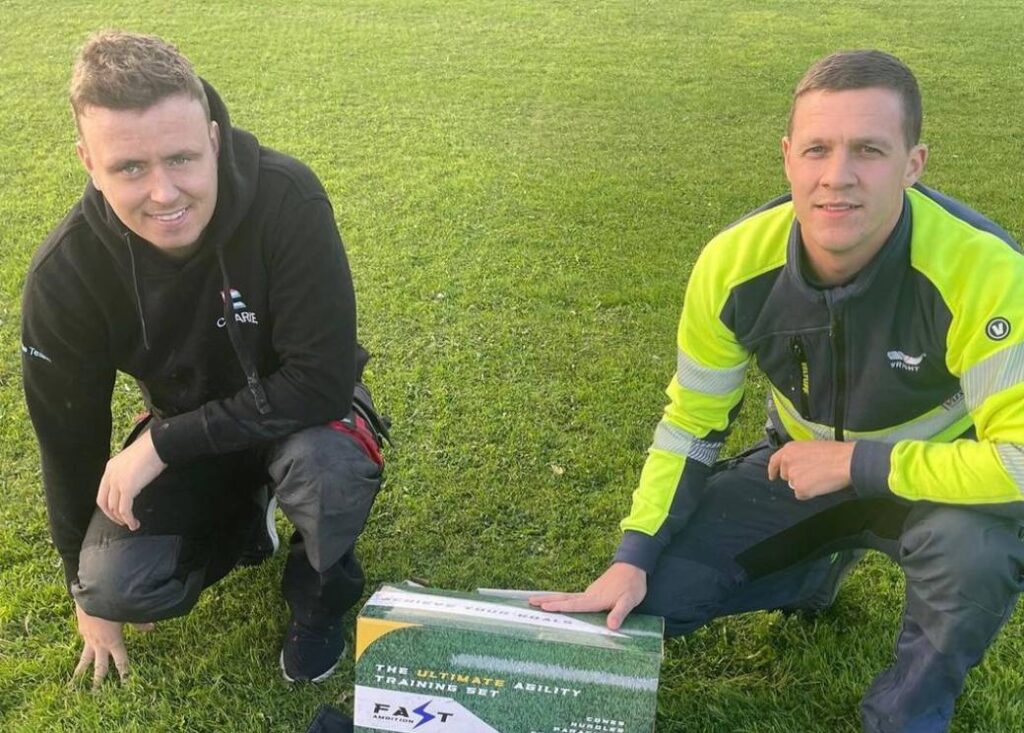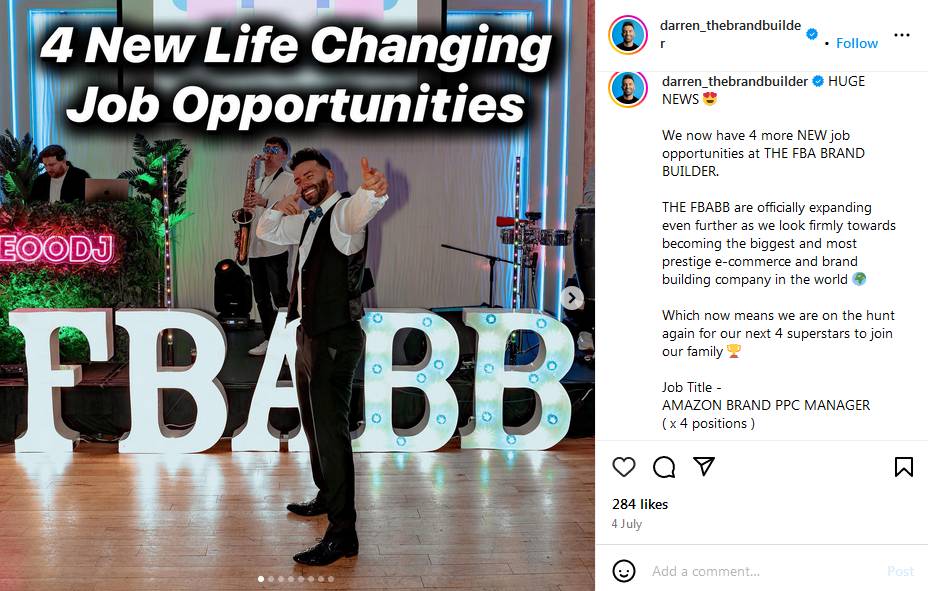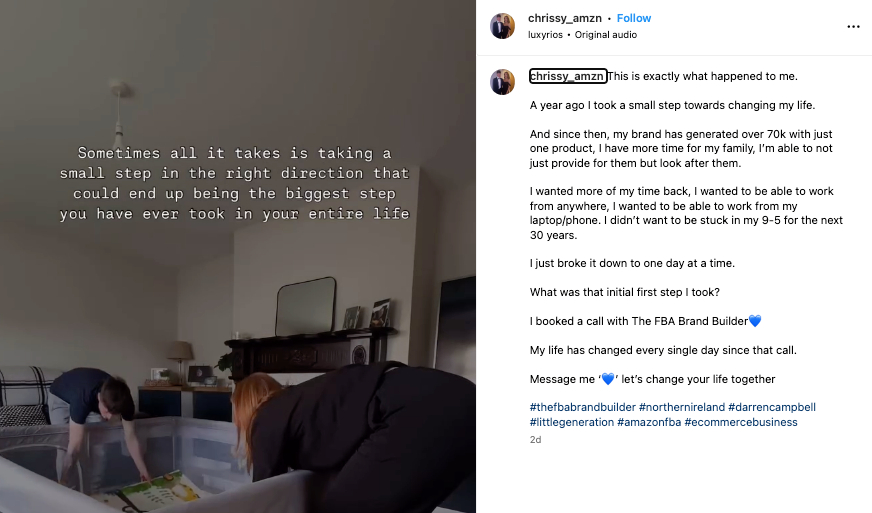Darren Campbell, founder of the FBA Brand Builder, recently sent out an email that speaks directly to people’s frustrations with the daily grind, offering a vision of financial freedom through brand-building on Amazon. Using a blend of motivational language and pointed questions like, “Are you still selling your dreams?” Campbell’s message paints a familiar story: quit your job, follow his program, and reclaim your life.
But a closer look reveals a few red flags around how this narrative holds up in practice, especially for those already invested in the program.
Playing on Emotions
The email frames the idea of staying in a steady job as equivalent to “selling your dreams,” a message that can resonate with anyone who’s ever felt stuck in a job they don’t love. Lines like “Are you really going to keep selling your dreams in exchange for that?” and “I stopped letting them buy my dreams” are designed to stir up a sense of dissatisfaction and urgency. For those feeling the squeeze of everyday responsibilities, it can feel like a lifeline—but what does FBA Brand Builder really deliver?
The approach isn’t new. High-pressure sales tactics often tap into personal dreams and dissatisfaction, creating an emotional pull before explaining the program’s practicalities. But for anyone interested in Campbell’s pitch, it’s essential to know the complete story, especially the financial and operational realities. Many former clients have spoken to us about their experience with high initial costs, unexpected fees, and an inconsistent support network, which are all worth weighing against the dream Campbell is selling.
Learn more: Financial Strain and Unanticipated Costs in FBA Brand Builder: What Clients Should Know

Promises That Need Proof
We recently looked into some of the high-profile success stories he touts, including Fast Ambition, which Campbell claims is on the path to generating millions. Yet our analysis of public records doesn’t quite match the revenue claims he’s promoting. Without concrete proof, the stories seem more like marketing highlights than a reliable predictor of what other clients can expect.
Campbell’s personal story—one of a supposed leap from paycheck to prosperity—is intended as a model for others. His email reads like a playbook for how to “take back your dreams,” which is compelling. But while he claims this path leads to success, few of his “success stories” offer much by way of verifiable proof. While he frequently shares the wins of his top clients, actual metrics or proof of widespread success among participants remain notably absent.
Learn more: FBA Brand Builder of the Year: What’s Behind the Success Story of Fast Ambition?

Selling “Freedom” at a High Cost
In his email, Campbell speaks to financial independence and freedom from the “paycheck-to-paycheck” lifestyle. It’s a compelling message—who doesn’t want to escape the daily grind? But here’s the thing: the costs of starting an FBA business can be steep. Between sourcing products, paying for advertising, and covering Campbell’s course fees, the initial costs alone are enough to give many potential clients pause.
For a supposed low-effort, high-reward opportunity, the story from former clients paints a different picture. Many have reported significant upfront fees and even hidden costs that make the road to profitability far harder than advertised. And while Campbell describes FBA Brand Builder as a way to “stop selling your dreams,” his own “hardest worker in the world” narrative contrasts sharply with the notion of “passive income,” suggesting instead a hefty workload with questionable returns.
Learn more: Promises vs. Reality: The Limited Value of FBA Brand Builder Training and Resources

The Problem with Transparency
Another issue worth mentioning is the general lack of transparency around client success. Established business programs typically publish data, case studies, or client testimonials. FBA Brand Builder, on the other hand, relies heavily on sweeping success stories and motivational speeches from Campbell himself. Many clients have expressed frustration with this approach, as it leaves them unsure of how their progress stacks up to others or how achievable the promised outcomes actually are.
Our look at the FBA Brand Builder Awards brought up similar concerns. While awards ceremonies are often inspiring, Campbell’s events lack clear judging criteria and independent oversight, leaving clients to wonder how achievements are actually measured. If FBA Brand Builder wants to be viewed as a credible program, this transparency is essential.
Learn more: The FBA Brand Builder Awards Need Clearer Judging Criteria

Clients as Marketers
A closer look at the program reveals that referrals play a major role in its growth. Participants are encouraged to bring in new members, often acting as informal marketers for the program. And while there’s nothing inherently wrong with client referrals, it becomes concerning if these financial incentives aren’t disclosed, creating a blurred line between genuine recommendations and marketing.
Clients have described feeling pressured to post about their FBA Brand Builder experience on social media, a practice that raises ethical concerns if financial incentives aren’t clearly stated. For prospective clients, it’s worth considering whether the success stories they’re seeing are fully transparent or motivated by referral bonuses.
Learn more: The Referral Web: Examining Incentives for FBA Brand Builder Ambassadors

Is It All Just Hype?
Campbell’s email campaign uses emotional language to sell a lifestyle many people dream of: financial freedom, career independence, and time with family. But based on former clients’ accounts, the reality seems to fall short. For anyone considering joining, there’s an important distinction between Campbell’s narrative and the actual outcomes seen by a wide range of clients.
While Campbell’s words offer hope, those thinking of joining would do well to consider the full context—reading reviews, checking the contract, and verifying the success stories beyond the motivational emails. The dream Campbell is selling may be tempting, but as with any investment, the facts should always come first.
TL;DR
The FBA Brand Builder presents a compelling case for escaping traditional employment to follow dreams, but a lack of verified client outcomes and transparent practices makes this promise seem tenuous. For those weighing the choice to join, due diligence—along with asking tough questions about financial commitment and realistic outcomes—is the best way to decide if this “dream” is worth pursuing.

